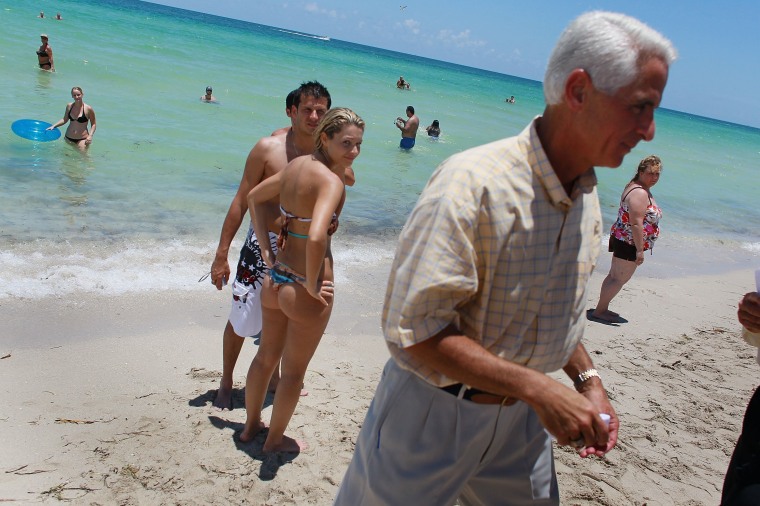Gov. Charlie Crist sidestepped bikini-clad sunbathers as he strolled down Miami's famed South Beach Wednesday surrounded by a throng of reporters. It was a carefully choreographed moment intended for one audience: foreign travelers.
Nearly half of the 12 million visitors that traveled to Miami-Dade County in 2009 came from other countries, tourism officials say. And although no tar balls from the Gulf of Mexico oil spill have hit South Florida, hotel and restaurant owners worry images of the gooey oil far away on the Panhandle is scaring foreign vacationers from South Florida.
"People outside of the U.S. look at Florida as one (beach) and don't understand if there's a little bit of oil in the Panhandle, they think it's all over the state," said Miami Beach Rep. Richard Steinberg.
The Democrat was among roughly a dozen local officials who asked Crist to spend some of the $83 million BP has given the state on advertising targeting European and other foreign travelers. So far $25 million has been committed to tourism — but only about half has been dispersed, and none of that money is going toward international ads.
"Foreign visitors stay longer and spend more," said Bill Talbert, president and CEO the Greater Miami Convention & Visitors Bureau.
Visit Florida, the state's tourism marketing agency, used BP money on a campaign proclaiming the "coast is clear," but pulled the ads June 3 after the oil crept closer to the Panhandle.
Now South Florida tourism officials are pushing for another campaign to clarify that the vast majority of Florida's 825 miles of beaches are oil-free. Miami and Fort Lauderdale accounted for about 20 percent of the tens of millions generated by tourism in 2008.
South Florida officials are worried President Barack Obama's scheduled visit to Pensacola on Tuesday could send the wrong message to foreign tourists.
"The image is going to be oil on the beach and exacerbate the issue and have people think that Florida is worse off tomorrow than it is today by the President being here," Steinberg said.
Crist, who walked the shorelines Wednesdays in loafers and khaki pants, declined to specify how much would be spent on advertising but promised it would be significant.
His visit was intended to demonstrate only northwest Florida has been affected by the April 20 drilling rig explosion that killed 11 workers. The rig was operated by BP and owned by Transocean Ltd.
Tar balls and patties ranging from five inches large to dime-sized have been scattered across the Panhandle, and Perdido Pass and Pensacola pass are being closed to prevent the oil from affecting water inland. The state has also temporarily banned the harvesting of saltwater fish, crabs and shrimp.
